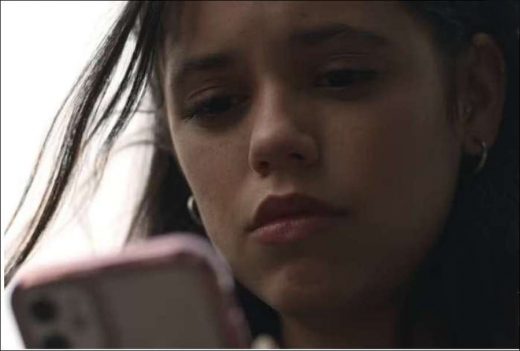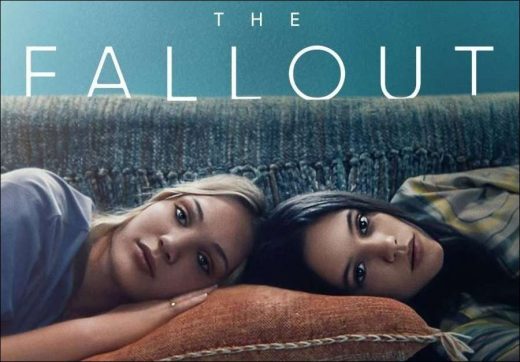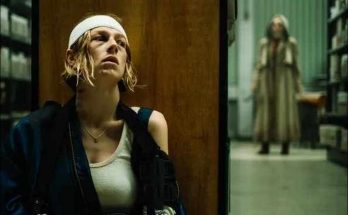The Fallout movie review. Megan Park’s directorial debut (which she wrote), The Fallout, is the latest movie to tackle gun violence. Unlike previous works centered on teenage domestic terrorism, The Fallout, streaming now on HBO Max, offers a restrained approach to the complexity of teenage trauma in the aftermath of a high school shooting. Instead of relying upon the so-called (and oft-controversial) “trauma plot”—an easy grab for a movie like this one—the film sensitively portrays the breakdown that can follow such a tragedy, without allowing that tragedy to swallow its characters whole.
By signing up, you agree to our Privacy Policy and Terms.
At first glance, The Fallout could easily read as a typical Gen-Z coming-of-age story: Vada, the film’s 16-year-old protagonist (the impressive Jenna Ortega), struggles to get out of bed, snags a ride to school with her bestie Nick (Will Ropp) on the way to school, grabs Starbucks, and scans her social media feeds. But that feeling of normalcy is short-lived.
After asking a teacher permission to use the bathroom during class to call back her pre-teen sister Amelia (Lumi Pollack), Vada ends up in the bathroom with fellow classmate and dance influencer Mia (Maddie Ziegler. As Vada begins to make conversation with Mia, shots ring out in the hallway, and the duo rushes to seek refuge in a stall. While the film avoids showing any guns or dead bodies, the anxiety of potential doom is palpable. As one of their peers, Quinton (Niles Fitch), bursts into the bathroom covered in blood, they fear he’s the shooter. He’s not—instead, Quinton is covered in his brother’s blood. There’s no need for anything more gratuitous: The scene is chilling, and telling, enough.

Although Vada, Mia, and Quinton survive the shooting, the five minutes spent in that bathroom stall are unsettlingly unforgettable for them and the viewer. It runs in real time, with tight close-ups refusing to offer reprieve from the abrupt intensity of the situation. The film’s primary concern, however, is with the aftermath of the tragedy and the ways in which Vada, Mia, and the other survivors try to cope with what happened.
In the days that follow the shooting, Vada and Mia grow closer over their shared experience, as they confide in one another about their resulting nightmares and insomnia. The intensity of the bond stemming from their collective grief serves as the core of this relationship, which grows more powerful with late-night phone calls, daytime distractions, wine, and (spoiler alert) romance.
As the two grow closer, what The Fallout ultimately conveys is the dynamic shape that trauma can take and how crucial it is to show compassion. Despite having the support of her family (and a young therapist, played by Shailene Woodley) the events leave Vada numb and avoidant. She turns to escapism for comfort, getting drunk, avoiding school, and getting high on ecstasy during class when she eventually does go back, all to make it through the day.
Mia, whose dads are rarely home and still don’t return to care for her after the shooting, self-isolates and remains terrified to go back to both dance and her life before. Meanwhile, Nick becomes a David Hogg-like activist turning his rage and trauma into activism; he feels increasingly resentful of Vada and her post-shooting languishing. Quinton copes by trying to move forward on his own terms and by remembering his late brother’s joy.
Eventually, Vada and Mia come to terms with their trauma. The former has an emotional breakthrough and the latter finally returns to dance. Still, the events of that tragic day still loom beneath the surface. In the film’s final scene, Vada looks to the sky and seemingly finds a moment of peace while waiting for Mia to finish dance practice. But any sense of peace is gone when she gets an alert on her phone about another school shooting. Just reading the headline is a trigger that causes Vada to hyperventilate and tear up.
It would have been easy for The Fallout to land in the simplistic, emotionally manipulative trauma plot territory—which, as The New Yorker pointed out, “flattens, distorts [and] reduces character to symptom.” Perhaps the most obvious approach could have been a two-hour journey solely focused on a one-dimensional look at grief in the aftermath of the shooting, paired with a happily ever after.
But The Fallout circumvents the plot formulation by showing the range that suffering can take in the face of such a jarring event—and without making that event the entirety of their lives and the storyline. While grappling with the tragedy, Vada explores substances and her sexuality, in relation to but not defined by her experience. She heals her relationships within her family, which are fractured not just by the shooting, but by the reality that is being a teenage girl. That the film ultimately lacks a real sense of resolve mirrors life without contrivance: The threat and fear of gun violence is a rule, not an exception, in the lives of every American teenager today.
The Fallout doesn’t need fanfare or gore to make its point: In its starkness, the film is undeniably striking and reveals no matter how much healing takes place after a tragedy like a school shooting, its devastating impact will persist. The ending is perhaps the best and most realistic one Park could have given viewers—a path forward that will always be flanked by P.T.S.D. and the grim normalization of everyday school shootings. In a country where guns are prioritized over people, it’s a reality Gen Z and beyond will, unfortunately, be forced to deal with, and we should be forced to watch.
The Fallout (2021)
Directed by: Megan Park
Starring: Jenna Ortega, Maddie Ziegler, Niles Fitch, Will Ropp, Lumi Pollack, Julie Bowen, Shailene Woodley, Christine Horn, Austin Zajur, Yindra Zayas, Nancy Arnstein, Tiffany Rae Jones
Screenplay by: Megan Park
Production Design by: Justin Dragonass
Cinematography by: Kristen Correll
Film Editing by: Jennifer Lee
Costume Design by: Tasha Goldthwait
Set Decoration by: Katie Carey
Art Direction by: Alex Rose
Music by: Finneas O’Connell
MPAA Rating: R for language throughout, and teen drug and alcohol use.
Distributed by: Warner Bros. Home Entertainment
Release Date: March 17, 2021
Visits: 53




